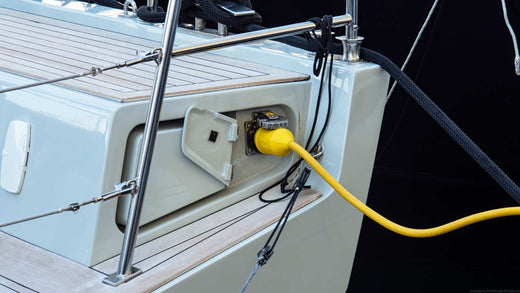
Choosing the Right Battery for Powering Accessories on Your Boat
Nicholas HeislerShare
If you're a boat owner who enjoys using a variety of onboard accessories, from fish finders to navigation systems, knowing which battery will best power these electronics is essential for convenience, safety, and enjoyment on the water. Below, we'll break down the best types of batteries for powering accessories, key factors to consider, and tips for maintaining battery life and performance.
What's the Best Type of Battery for Accessories?
For powering accessories, deep cycle batteries are generally the best choice. Unlike starter batteries, which are designed to deliver short bursts of high energy for starting an engine, deep cycle batteries are built to provide a steady flow of power over extended periods, making them ideal for running devices like lights, radios, and other boat electronics. Here are a few battery types suitable for powering boat accessories:
AGM (Absorbent Glass Mat) Batteries
AGM batteries are a type of sealed lead-acid battery that offers durability and resistance to vibrations, a crucial factor for marine applications. They're virtually maintenance-free and don't require water topping, making them highly convenient for boaters. AGM batteries are a reliable choice for handling moderate to high electrical loads from multiple devices.
Lithium-Ion Batteries
While more expensive upfront, lithium-ion batteries have a longer lifespan, are lightweight, and deliver consistent performance. They can be a game-changer for boaters who need extended power without frequent recharging. Although an investment, lithium batteries also recharge faster and hold a higher voltage for longer durations, which can be valuable for frequent boat users.
Gel Batteries
Similar to AGM batteries, gel batteries are also sealed lead-acid batteries but use a gel electrolyte. These batteries are highly resistant to spillage and perform well in extreme temperatures, though they may require a slower charging process to avoid damage. Gel batteries can be a great option for those boating in various climates.
Factors to Consider When Choosing a Battery
1. Power Requirements
Before choosing a battery, assess the total power requirements for all the accessories you plan to use. Most accessories come with their own power ratings (measured in amps or watts), so adding up these requirements will give you a good idea of the type and capacity of battery needed.
2. Battery Capacity (Amp-Hours)
The capacity of a battery, measured in amp-hours (Ah), indicates how long it can power your accessories. Higher amp-hour ratings mean the battery will last longer on a single charge. For example, if your accessories consume 10 amps and you have a 100Ah battery, you can expect about 10 hours of use before needing a recharge.
3. Compatibility with Existing System
Ensure that your chosen battery integrates well with the existing electrical system and charger on your boat. Some boats may be better suited for specific battery types or sizes, so check with your boat manufacturer or a marine electrician if you're unsure.
Best Practices for Marine Battery Care
1. Regularly Charge the Battery
Allowing a battery to fully discharge can reduce its lifespan, especially in deep-cycle batteries. Try to charge the battery as soon as possible after use, ideally keeping it within 20% of a full charge whenever possible. Marine battery chargers are specifically designed to handle the charging needs of deep-cycle batteries, so investing in one is wise.
2. Check Connections and Terminals
Corrosion or loose connections can hinder the battery's performance and, in some cases, damage it. Clean the terminals regularly and make sure all connections are tight. Marine-grade anti-corrosion sprays can help prolong battery life by protecting it from saltwater exposure.
3. Store in a Cool, Dry Place
When not in use, store your battery in a location where it's safe from temperature extremes. Prolonged exposure to high heat can cause battery fluid evaporation, shortening its lifespan, while extreme cold can lead to reduced performance.
4. Use a Battery Monitor
Battery monitors are a great tool for boaters using multiple electronics, as they help track the charge and discharge levels. Knowing the battery's exact status can prevent unintentional draining and unexpected power loss while out on the water.
The Importance of Using the Right Battery
Choosing the right battery for your boat's accessories can make a significant difference in your overall boating experience. By selecting a high-quality deep cycle battery and following a few best practices, you'll enjoy reliable power for all your devices and accessories whenever you need them.
When it comes to keeping your fishing boat clean, look to Captains Preferred Products' boat cleaners and chemicals. Find everything you need to keep your vessel squeaky clean all season - always at the best prices.




